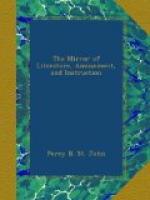The Illustrations are varied and interesting. One of them—the Death of the Dove, engraved by W. Finden, from a picture by T. Stewardson, is remarkably expressive. The Ghaut, by E. Finden, after W. Daniell, is an exquisite Oriental scene. The Frontispiece, Wilkie’s Spanish Princess, is finely engraved by R. Greaves; and Mr. H. Le Keux has done ample justice to the Place de Jeanne d’Arc, Rouen, from a picturesque drawing, by S. Prout: the lights and shadows being very effectively managed. But we must be chary of our room, as we have other claimants at hand.
* * * * *
THE JUVENILE FORGET-ME-NOT.
This little work is a sort of protege of The Forget-Me-Not, and is by the same editor. It contains fifty pieces in verse and prose, and eight pleasing plates and a vignette—all which will please the little folks more than our description of them would their elders. Nearly all of them contain several figures, but one—The Riding School—about twenty boys playing at Soldiers, horse and foot, very pleasantly illustrates an observation in a recent number of the Edinburgh Review, on the dramatic character of the amusements of children. The scene is a large, ancient, dilapidated building, and the little people personate the Duke of Wellington, the Marquess of Anglesea, &c., with all the precision of military tactics—but no one has a taste for being a private. So it is through life.
Our extract is almost a literary curiosity:
“THE INVALID’S PIPE.[2]
[2] This story has been transmitted
to the Editor as the genuine
production
of the son of a British military officer, only nine
years
of age, and composed from a circumstance which actually
occurred
in a noble German family.
“It was not far from the Castle of Fuerstenstein, near the spot where the gallant Blucher, with the brave army of Silesia, won such glory, that the Baron of Fuerstenstein met a maimed soldier, who was endeavouring to reach Berlin to claim his pension, and whose age denoted that his wounds had long been his honourable though painful companions. The Baron, observing a very richly mounted pipe in the old man’s possession, accosted him with, ’God bless you, old soldier! does your pipe comfort you this morning?’ The pipe which the old soldier was smoking was made of a curious sort of porcelain, and mounted with gold. The Baron wondered to see so costly a pipe in the old soldier’s possession, and wishing to purchase it from him, said, ’My friend! what shall I give you for your pipe?’
“‘Oh, sir!’ replied the soldier, shaking his head, ’this pipe I can never part with; it was the gift of the bravest of men, who took it from a Turkish Bashaw at the battle of Belgrade. There, sir, thanks to Prince Eugene, we obtained noble spoils—there, where our troops so bravely destroyed the Turkish squadrons.’




